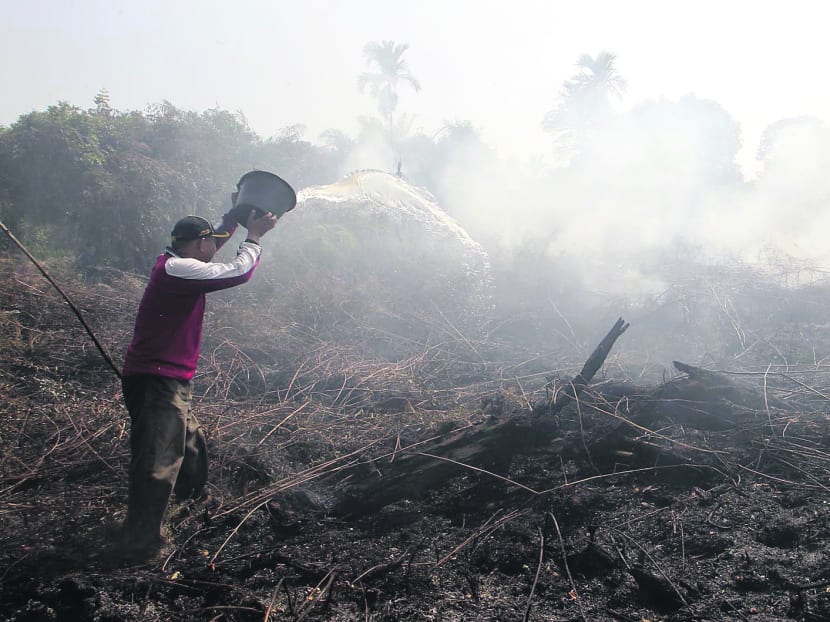A regional look at haze issue needed: Shanmugam
SINGAPORE — The first and most important step in dealing with the haze is to put out the fires in Indonesia, even though Singapore’s Law and Foreign Affairs Minister K Shanmugam said the Association of Southeast Asian Nations (ASEAN) will also need to discuss the frameworks that can be put in place to address future environment issues — such as floods and other natural disasters — that may arise.

Mr Mohammad Azaki attempts to put out a fire on a patch of private land across from his house in Parit Indah, Pekanbaru. Photo: Ooi Boon Keong
SINGAPORE — The first and most important step in dealing with the haze is to put out the fires in Indonesia, even though Singapore’s Law and Foreign Affairs Minister K Shanmugam said the Association of Southeast Asian Nations (ASEAN) will also need to discuss the frameworks that can be put in place to address future environment issues — such as floods and other natural disasters — that may arise.
Speaking to the BBC ahead of this weekend’s ASEAN Ministerial Meeting in Brunei, Mr Shanmugam noted that while Singapore has enjoyed “a few clear days” this week, areas in Malaysia and in Indonesia remain in “a state of emergency”.
“And when the winds shift, we could easily be engulfed again,” he added in the interview, which was aired yesterday.
Indonesian President Susilo Bambang Yudhoyono’s “very statesman-like” apology and statement on Monday sent a clear message to his own officials and also gave indications of “substantially increased resources to deal with the fires”, said Mr Shanmugam, who added that both Singapore and Malaysia have also offered their assistance.
“That is the first step — (the) most important — to see,” he said.
Next, the region will need to ensure that the haze will not be happening “every year or once in five years”.
“We really need a sort of a regional look at this because it is not just an Indonesia issue, a Singapore issue or a Malaysia issue. It affects the region and, indeed, the world in terms of CO2 (carbon dioxide) emissions,” said Mr Shanmugam, who added that he would hold talks with his counterparts from Indonesia and Malaysia, with the issue also to be discussed by ASEAN.
Discussions, however, have to be conducted in “a constructive, problem-solving way, rather than looking specifically at individual countries”.
“We’ll have to see how, in what appropriate forum, this can be discussed, what sort of mechanisms can be put in place. This is really a question of trying to work on regional issues. It’s not just the haze — there are floods, there are other natural disasters. How do we handle all these? This is a matter of interest, not just to the three countries but other countries as well,” said Mr Shanmugam.
The minister said Singapore would press Indonesia for evidence concerning the companies which are involved in starting the fires. First, Singapore would like to know who owns the land, which Mr Shanmugam said only the Indonesian authorities would know. Second, it would like to receive evidence, based on eye-witness accounts, as to who was responsible for starting the fires.
“We need these two, and with that, I think we can do something,” Mr Shanmugam said.
When asked specifically about the steps Singapore will take to try to address these issues and go after the companies at fault, Mr Shanmugam replied: “I do not want to go into that right now, but we have worked out with the Attorney-General a set of steps that we can take. If and when we get the evidence, then we will look at it.”






